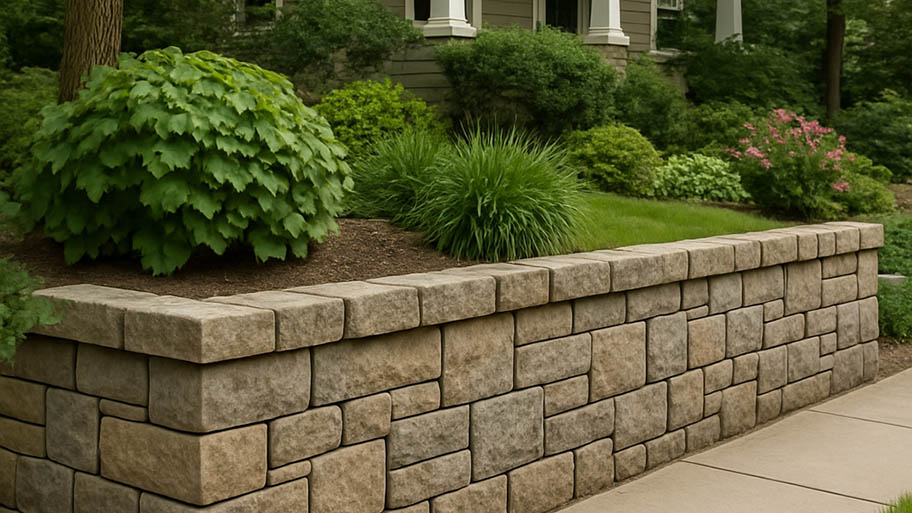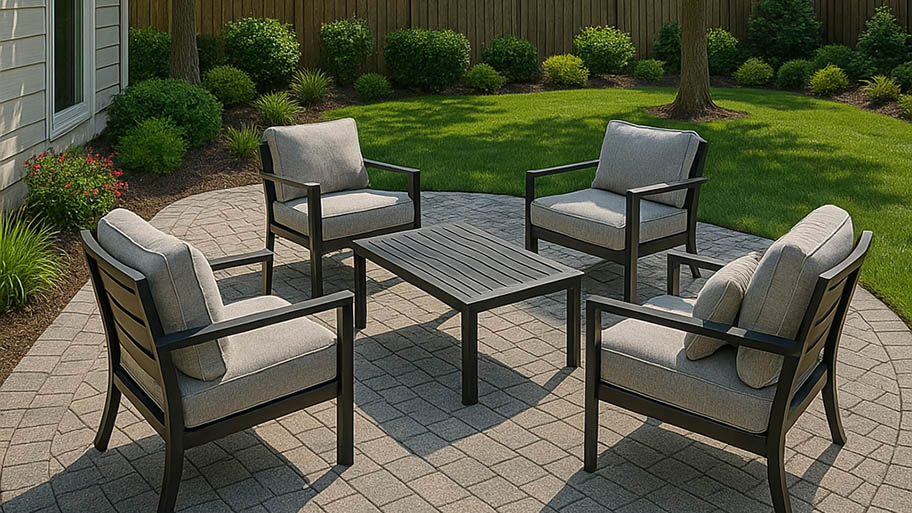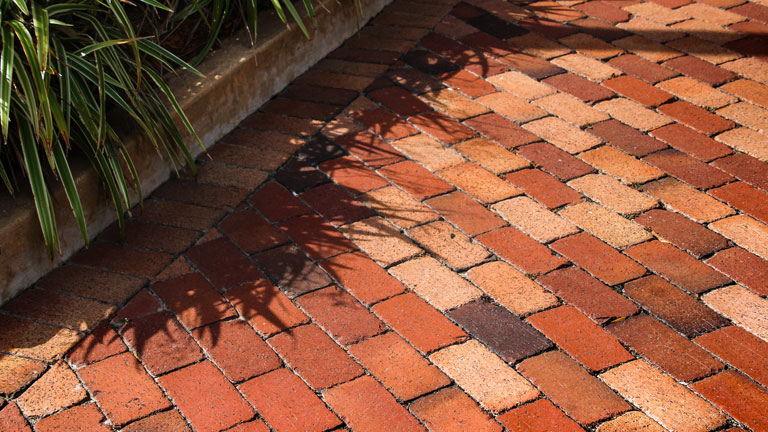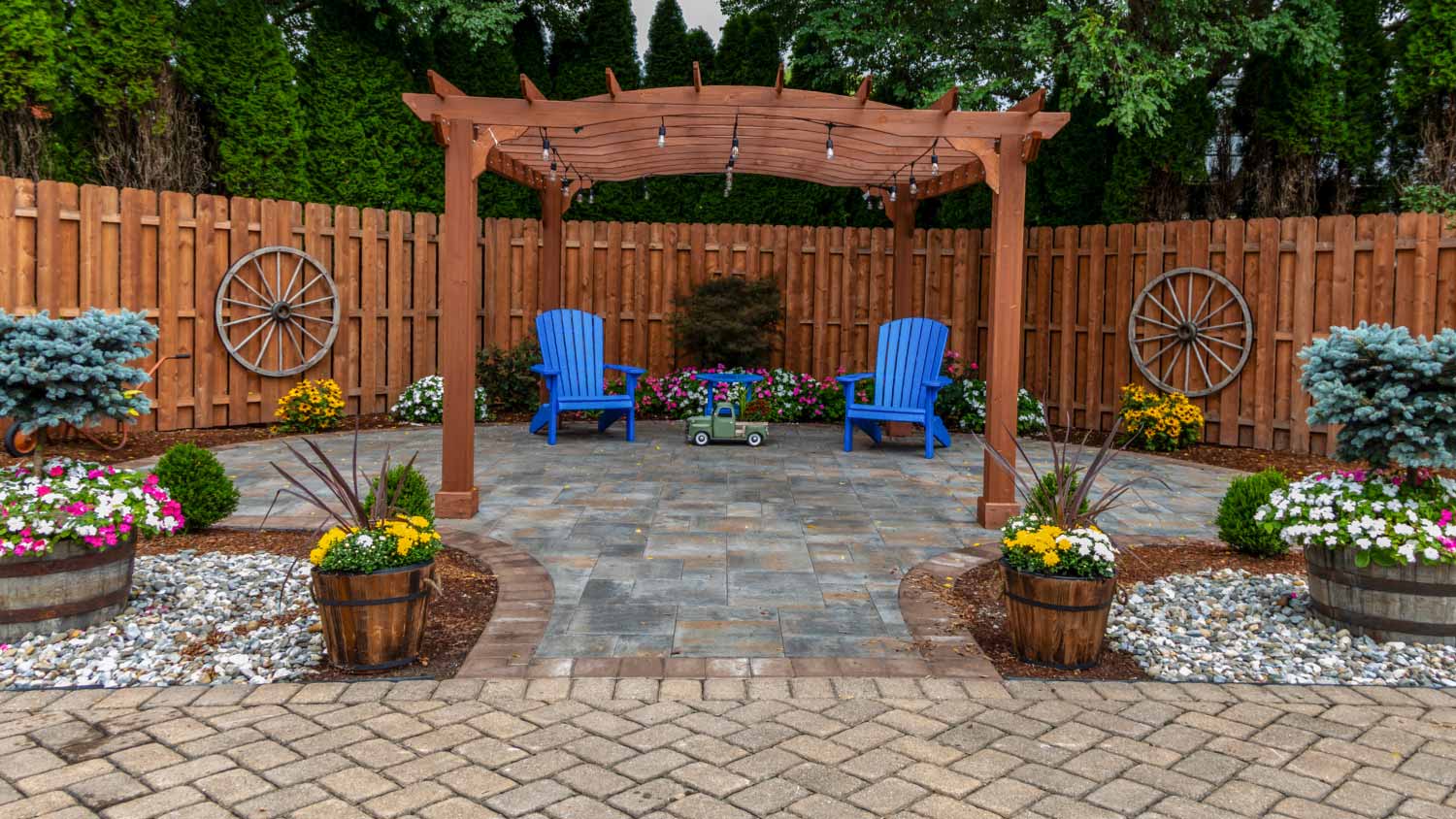
Kick erosion to the curb with an eye-catching retaining wall. Retaining wall costs vary based on the material, but this guide will help you budget.
Sometimes, a beautiful and eco-conscious lawn requires a grassroots effort


Grass paver blocks create a permeable grid that allows grass to grow between blocks.
These pavers are ideal for driveways, larger parking areas, and walkways.
A grid of plastic or concrete pavers can prevent erosion and stormwater runoff.
They are not the best pavers for patios or walkways that require an even surface.
Landscaping is often a balancing act between building a stable, livable lawn and retaining its natural ecosystem. Grass paver blocks—also known as turf paver blocks—create a permeable grid for driveways, parking areas, and walkways that offer this balance. Not only do grass paver blocks save a bit of lush greenery on your lawn, but they have plenty of eco-friendly and landscape-saving benefits as well. Here are the types of grass paver blocks to choose from and where they work best.
Grass paver blocks are an alternative to traditional concrete and asphalt pavers. Grass pavers are a form of permeable paver—or a paver that encourages the flow of water into the ground. You'll find interlocking grass pavers made from concrete or plastic. They either form a preset lattice or come in puzzle pieces that form a series of interlocking patterns.
Unlike poured concrete or traditional pavers, permeable grass paver blocks leave purposeful space for grass, flowers, or other foliage to grow. In some cases, a layer of sand, gravel, or other aggregate sits below the pavers for extra stability and filtration.
When choosing permeable grass pavers for your driveway or yard, you have a few options. The three main grass paver types are concrete permeable pavers, plastic interlocking grass paver blocks, and stable grid pavers. Let’s look at each of them and their primary uses.
Concrete grass pavers are the sturdiest for driveways, parking areas, and other heavy- or high-traffic locations because the strength of concrete gives it staying power under heavy vehicles. This type is the most costly, but it will last the longest and give you the most flexibility.
Plastic pavers are the most affordable and can be the easiest to install. However, they won’t bear as much weight as concrete pavers, so you’ll want to install them where they will only have to support the weight of small vehicles, infrequent light vehicle parking, or foot traffic.
If you intend to make a pathway with plastic grass pavers, choose ones with smaller cells to make walking on them easier. You can also use them with concrete pavers to save money in mixed-use areas that require stronger pavers alongside less sturdy plastic grass paver blocks.
Stable grid pavers are more like thick plastic netting than true pavers, but they serve a similar purpose. They’re often used on slopes where erosion is happening, has, or could happen. When stretched over the ground, the plastic mesh cells make room for soil and grass. The plastic grids help hold the grass in place as it puts down roots and prevent water and other erosive elements from washing or blowing the soil and grass away.
You’ll likely see these pavers in municipal and commercial projects along highways. Still, you can install stable grid paving mesh in yards with steep slopes or a history of washing out, eroding, or sliding.
Function and appearance are difficult factors to balance when planning a hardscape. You need a stable place to park your car or walk through the garden, but don't want to lose the benefits of the green turf. This is where grass pavers step in.
Driveways: Grass paver blocks are excellent candidates for driveways, but only when installed with an additional support system of gravel or sand. Without this, you risk sinking, unstable pavers when it takes the weight of the car each day. The gravel barrier also distributes and acts as an extra filter for rainwater runoff, making grass driveway pavers an excellent option. You’ll need to factor in the weight of your vehicle to help you decide which permeable grass pavers to choose—concrete is best for heavier vehicles and traffic.
Parking areas: Is your home a popular gathering spot for your friends and family? Grass paver blocks designate an additional parking area on your lawn without paving over more livable space, making paving with grass a breeze. Businesses often use the plastic grid or stone and concrete blocks for green parking lots, and this method works just as well at home.
Walkways: Incorporate grass paver blocks into the pathways throughout your lawn for more stability and a bit of extra style. The variety of herringbone, houndstooth, or grid patterns allows you to add artistry and stability when designing walkway ideas. Just be sure you choose paver blocks with smaller holes to prevent feet from sinking into the grass or other tripping hazards.
Sloped areas: As we'll chat about more below, permeable pavers can help prevent erosion. This is particularly helpful if you have a large hill on your lawn and frequent loose turf after a large storm.

Grass paver blocks do not provide the same level surface as traditional pavers and concrete, so they're not ideal in all spaces.
Patios: You will have a harder time setting up deck chairs and picnic tables on grass pavers. If you're not able to keep up with the growing grass, it could become a tripping hazard.
Accessible walkways: The uneven nature of grass paver blocks could make them harder to navigate for those with mobility differences. Only a few plastic grid pavers have received Americans with Disabilities Act (ADA) compliance approval. If you’re looking for a safe surface for ADA spaces or universal design areas, reconsider grass pavers or use them in areas with other, easier-to-navigate walkway options.
Grass pavers offer an appealing alternative to traditional paving materials, especially for homeowners looking to reduce runoff and add greenery to functional spaces. But like any landscape solution, they come with trade-offs. Understanding the pros and cons can help you decide whether they’re a good fit for your project.
| Pros of Grass Pavers | Cons of Grass Pavers |
|---|---|
| Decrease water runoff | Require maintenance |
| Prevent erosion | Break down faster than other pavers |
| Increase curb appeal | Not ideal for patios or accessible paths |
As we turn our attention to creating more eco-conscious landscapes, it's important to note exactly how our choices make a difference and where they face large challenges. Here are some common pros of paver blocks.
They decrease storm runoff: Stormwater runoff picks up damaging pollutants as it passes across impermeable surfaces, sending them into the groundwater and surrounding water systems. Since grass pavers provide a porous surface in areas prone to fuel, oil, and cleaning chemicals, they naturally decrease the risk of sewer runoff.
They prevent erosion: Less runoff means less flooding and erosion. The grid allows water to soak into the ground exactly where it falls instead of flowing to the next permeable surface, protecting the stability of your landscape and your nearby flower bed from washing away in the next downpour.
They increase curb appeal: There's no question that the vibrant grid of green is more eye-catching than black asphalt. New home buyers looking for eco-friendly landscapes will also appreciate the modern system to prevent runoff and erosion.
The pros are pretty convincing, but it’s also important to weigh the downsides of permeable pavers before choosing. Here are two reasons you may take a more common path.
They require more maintenance: Yes, you will have to mow, water, and fertilize the grass in between your pavers, even though the turf is much smaller than the rest of your lawn. Weeds also have a habit of growing in between pavers and require attention in the warmer months.
They break down faster: While adding an extra layer of gravel beneath the paver grid adds stability, the system will still break down more quickly than traditional patios and solid pavers. Grass pavers last between 10 and 15 years compared to stamped concrete or pavers, which last between 25 and 50 years.
They’re not ADA compliant: Because of their uneven surface and grassy gaps, grass pavers don’t meet ADA standards for accessibility. The grid system can make it difficult for wheelchairs, walkers, and even strollers to move smoothly across the surface. That’s why they’re not recommended for areas that need to be accessible or frequently walked on, like front walkways, patios, or entrances.
Be sure to trim and fertilize your plants with a specialty winter fertilizer before the temperature hits freezing. Since grass and plants go dormant in the cooler months, this will make sure they return stronger in the springtime.
When choosing permeable grass pavers for your driveway or yard, you have a few options. The three main grass paver types are concrete permeable pavers, plastic interlocking grass paver blocks, and stable grid pavers. Let’s look at each of them and their primary uses.
Concrete grass pavers are the sturdiest for driveways, parking areas, and other heavy- or high-traffic locations because the strength of concrete gives it staying power under heavy vehicles. This type is the most costly, but it will last the longest and give you the most flexibility.
Plastic pavers are the most affordable and can be the easiest to install. However, they won’t bear as much weight as concrete pavers, so you’ll want to install them where they will only have to support the weight of small vehicles, infrequent light vehicle parking, or foot traffic.
If you intend to make a pathway with plastic grass pavers, choose ones with smaller cells to make walking on them easier. You can also use them with concrete pavers to save money in mixed-use areas that require stronger pavers alongside less sturdy plastic grass paver blocks.
Stable grid pavers are more like thick plastic netting than true pavers, but they serve a similar purpose. They’re often used on slopes where erosion is happening, has, or could happen. When stretched over the ground, the plastic mesh cells make room for soil and grass. The plastic grids help hold the grass in place as it puts down roots and prevent water and other erosive elements from washing or blowing the soil and grass away.
You’ll likely see these pavers in municipal and commercial projects along highways. Still, you can install stable grid paving mesh in yards with steep slopes or a history of washing out, eroding, or sliding.
Grass paver blocks fall in line with—and may cost slightly less than—traditional pavers, cobblestones, and bricks. You'll pay between $10 and $20 per square foot, plus $40 and $70 per hour for professional installation. Don’t forget to consider additional paver driveway costs, such as gravel prices, as part of the total job.
Laying pavers is a challenging DIY job, but it’s possible for the experienced homeowner. When laying a grass paver block grid strong and level enough for parking a car, call a local hardscaping contractor to ensure it's level and stable the first time.
You'll have the option of either concrete blocks, plastic cells, or a large grid. For more stable installations that need to hold the weight of a car, the ground requires an extra layer of gravel or sand, as we mentioned earlier.
Many landscaping pros recommend planting pre-grown turf when first installing grass paver blocks. Depending on where you live, grass varieties that can handle heavy traffic are best, such as fescues, ryegrass, or Bermuda grass. You can also surround a grass paver grid with decomposed granite, flowers, succulents, and hardy shrubs.
From average costs to expert advice, get all the answers you need to get your job done.

Kick erosion to the curb with an eye-catching retaining wall. Retaining wall costs vary based on the material, but this guide will help you budget.

Looking to elevate your backyard aesthetic with a patio? Use this paver patio cost guide to help you estimate your total project cost before you get started.

While a stone wall typically costs thousands of dollars, the value it brings to your home can raise its value both aesthetically and monetarily.

Easily estimate how much concrete you need with our free concrete calculator. Convert dimensions to cubic yards or bags to avoid costly (and messy!) mistakes.

Discover the cost to install brick flooring in your home. Learn about installation, materials, labor, and ways to save on your next brick flooring project.

Learn about the key differences between concrete pavers and natural stone pavers and find the better option for your home.